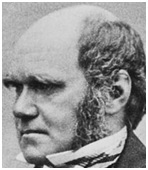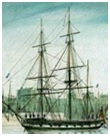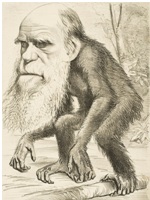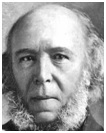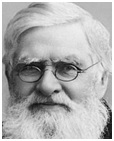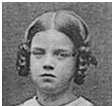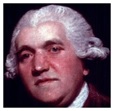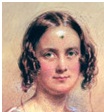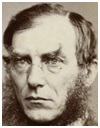|
 |
|
 |
|
|
||
Charles Darwin - Creativity and Science
Charles Darwin (1809-1882)
English naturalist (pictured right). Famous for his theory of evolution, based on his observations of different species during
his famous voyage (1831-6) in the Beagle, pictured right below, to South America and
the Galápagos Islands in the Pacific. Hugely influential in:
His most famous book is... The Origin of Species (1859) This discussed his theory of evolution.
Why was he so creative? 1. Revolutionary Darwin's theory of evolution disproved the traditional Christian view that God:
People evolved from apes, Darwin said (leading to attacks like the 1871 caricature pictured right). So lots of people just couldn’t believe:
This led to Herbert Spencer's (pictured right) idea of the “survival of the fittest” , introduced in 1864 But Darwin was a reluctant revolutionary. He kept his theory secret for 20 years until 1858, because he didn’t want to offend anybody. He was encouraged to publish by the publication of an academic article on evolution by the Welsh naturalist, Alfred Wallace (1823-1913), pictured right.
2. Determination and purpose His discoveries needed much thought and hard work. He also had to overcome:
But he was still driven by compassion for other people and hated slavery. He was dedicated to proving scientifically that blacks and whites were equals.
3. Wealth and leisure Darwin:
4. Observation, thinking and attention to detail During his five year voyage on the Beagle, he:
He listed the advantages and disadvantages of a particular idea (even his marriage!) before deciding upon its validity.
5. Support He had the devoted support of:
Hooker and Huxley's eloquence strongly defended evolution, much better than Darwin, who was shy and had poor debating skills. 6. Curiosity He was always intensely curious about new ideas, and all the different plants, animals and people he found in the Galápagos Islands. Closely examining their differences gave him the idea of evolution.
7. Courageous lover of truth His whole life was spent experimenting and learning in pursuit of truth. He was prepared to fight for his views against his critics, many of them Christians.
8. Application of different subjects and energy To explain evolution, he drew on philosophy, literature and economics, as well as science. Darwin also wrote an estimated six million words in books, articles and letters!
Key quote on competitive advantage In the struggle for survival, the fittest win at the expense of their rivals because they succeed in adapting themselves to their environment.
Key quote on science The law, does not concern itself with trifles, does not apply to science.
Key quote on family and children How paramount the future to the present when one is surrounded by children.
Key quote on education The more efficient causes of progress seem to consist of a good education...and of a high standard of excellence.
Key quote on time management A man who dares to waste one hour of time has not discovered the value of life.
Key quote on relationships A man’s friendships are one of the best measures of his worth.
Key quote on learning Ignorance more frequently begets confidence than does knowledge. |
|
|
||
|
|
||
| Copyright © wisdomtowin.com 2025 All Rights Reserved | ||
|


